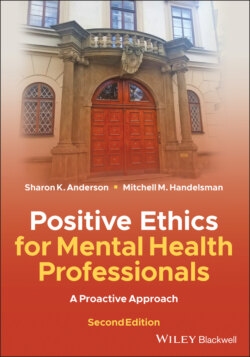Читать книгу Positive Ethics for Mental Health Professionals - Sharon K. Anderson - Страница 12
Ethical Acculturation
ОглавлениеWe and our students have found it useful to think of our profession—our mansion—as a new culture to which we need to adapt. The culture of psychotherapy, like any culture, has its own values, customs, language, traditions, rules for appropriate and inappropriate behaviors, and ways to express gratitude, respect, and reverence. When we live and move around in our mansion, the culture of psychotherapy, our ordinary moral sense will take us only so far (Kitchener & Anderson, 2011). As we engage in the process of ethical acculturation, we are actively creating, tweaking, and expressing our professional identity.
Our adaptation to the culture of psychotherapy, which we call ethical acculturation (Handelsman et al., 2005), involves awareness of all the rooms and furnishings in the mansion—the personal and the professional—and the staircase of ethics. What is your sense of right and wrong professional behavior? Who have you been throughout your life, in the many types of relationships of which you have been a part? How do you integrate the ethical traditions, values, rules—in short, the culture of psychotherapy—with your own moral intuitions, values, and backgrounds?
These tasks—professional/ethical identity development and ethical acculturation—might take you by surprise or seem unnecessary. You might be thinking that you already have enough of a personal foundation or moral compass to be an ethical practitioner. For example, (a) you are very motivated to listen and to help people, (b) others tell you that you are a nice person, and (c) you have never been convicted of a felony. These statements may all be true; however, there are two major reasons why we need to engage in these tasks intentionally and mindfully. First, psychotherapy is a complex profession—the therapeutic relationship includes a unique combination of roles and behaviors. It can also include different contexts and stakeholders. Second, human beings are prone to imperfect cognitive and emotional processing—we often find it hard to (a) identify the ethical components of a professional decision, (b) judge accurately what a right ethical action is, and/or (c) implement our ethical judgments, especially under stressful conditions.
